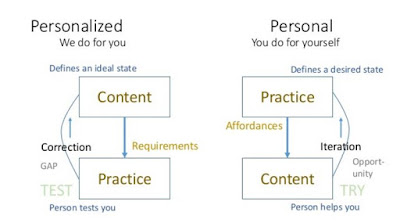Friday 30 October 2015
Productive Failure and Inspiring Learning - providing affordances
Is there evidence that "instruction" is not the best way of having learning occur? The traditional teach and test method seems rational, but is it how we learn? Does acquiring learning in this way inhibit a richer learning?
A post in Quartz pointed me to a paper by Manu Kapur and June Lee on Productive Failure (Designing for Productive Failure in Mathematical Problem Solving - National Institute of Education, Singapore; 2013). The researchers wanted to compare providing complex problems without scaffolds with traditional lecture and practice:
"...seventh-grade mathematics students from intact classes experienced one of two conditions: a) productive failure, where students solved complex, ill-structured problems on average speed without any instructional support or scaffolds up until a teacher-led consolidation, or b) traditional lecture and practice. Despite seemingly failing in their collective and individual problem-solving efforts, students from the productive failure condition significantly outperformed their counterparts from the other two conditions on both the well-structured and higher-order application problems on the post-test. The second study, conducted in another school with significantly lower academic ability students, replicated the findings of the first study. Findings and implications of productive failure for theory, design of learning, and future research are discussed."
This does remind me of the very open "Investigations" approach to learning in Mathematics and the current "Inquiry" approaches of the IB Primary Years and Middle Years Programmes.
The paper describes how students learning by Productive Failure (PL) outperformed the ones by Lecture and Practice (LP). But what is even more interesting is that the PF approach did not shut off other ways of thinking or structuring problems whilst the LP way cemented one way. The WAY of learning enabled opportunities, affordances, to a more complete set of methods and ways of thinking (representations).
From the conclusion:
"...but the process of exploring the problem and solution spaces for representations and methods for solving the problem may have engendered sufficient knowledge differentiation that prepared them to better discern and understand those very concepts, representation, and methods when presented in a well-assembled, structured form during the consolidation lecture (Marton, 2007; Schwartz & Bransford, 1998). Furthermore, it is plausible that having explored various representations and methods for solving the complex ill-structured problems, they perhaps better understood the affordances of the representations and methods when delivered by the teacher during the consolidation lecture. In other words, when the teacher explained the “canonical” representations and methods for solving the problem, they perhaps better understood not only why the canonical representations and methods work but also the reasons why the non-canonical ones—the ones they tried—did not work."
Does this apply to "older" students too? Stephen Downes' latest talk on "Learning through practice" has the following slide (#17):
Here, Downes places practice firmly before content under the "Personal Learning" approach. It is the affordances again, that enriches the learning achieved by this approach. Although his slides are about cMOOCs, they are worth reviewing since they take learning into the more adult sphere.
Having gone through several cMOOCs (including the whopper #change11 which really changed how I thought about this process) I can see the connections between Kapur's Productive Failure and Downes' Personal Learning. Inspiring.
Saturday 24 October 2015
"Learning" vs "Instruction"
I am concerned about using the word "instruction" to describe the setting for teaching and learning. It seems so one directional.
If you are to "instruct" you must carefully define what it is you are going to instruct and pass the instruction on in some way. The WAY that learning takes place is crucial for determining the success of the learning (open to receiving the learning in the first place, latched on to existing knowledge, using it, recalling it later, ...). Too often it is seen as transmission and one-directional.
Two separate thought-joggers about this from today's blog trawl:
1. "Learning based on INQUIRY rather than AQUIRY" - Nigel Gardner's title for his LinkedIn post sharing "It takes a village to raise a SOLE" (Self-Organised Learner).
2. It's the way you do it: Karl M Kapp's SlideShare presentation "Don't Think Like an Instructional Designer - Think Like a Game Designer".
Really worth a look at - how to keep excitement and learning alive in the classroom.
If you are to "instruct" you must carefully define what it is you are going to instruct and pass the instruction on in some way. The WAY that learning takes place is crucial for determining the success of the learning (open to receiving the learning in the first place, latched on to existing knowledge, using it, recalling it later, ...). Too often it is seen as transmission and one-directional.
Two separate thought-joggers about this from today's blog trawl:
1. "Learning based on INQUIRY rather than AQUIRY" - Nigel Gardner's title for his LinkedIn post sharing "It takes a village to raise a SOLE" (Self-Organised Learner).
2. It's the way you do it: Karl M Kapp's SlideShare presentation "Don't Think Like an Instructional Designer - Think Like a Game Designer".
Really worth a look at - how to keep excitement and learning alive in the classroom.
Subscribe to:
Posts (Atom)

